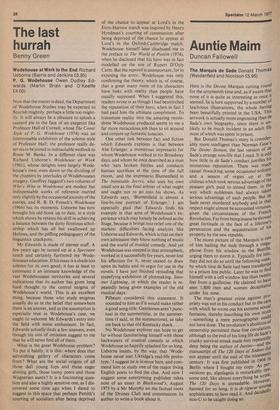The last hurrah
Benny Green
Wodehouse at Work to the End Richard Usborne (Barrie and Jenkins £5.95) P. G. Wodehouse Owen Dudley Edwards (Martin Brian and O'Keefe £4.00)
Now that the master is dead, the Department of Wodehouse Studies may be expected to flourish mightily, perhaps a little too mightily. It will always be a pleasure to splosh a custard pie in the face of an exegetist like Professor Hall of Cornell, whose The Comic Style of P. G. Wodehouse (1974) was an interminable exhibition of the solemn style of Professor Hall; the professor really deserves to be joined in indissoluble wedlock to Rosie M. Banks. In a different class was Richard Usborne's Wodehouse at Work (1961), whose delights were largely Wodehouse's own, even down to the dividing of the chapters by interludes of Wodehousean imagery. Geoffrey Jaggard's two volumes of Who's Who in Wodehouse are modest but indispensable works of reference marred only slightly by the occasional jocosity of the entries, and R. B. D. French's Wodehouse (1966) has its moments. Usborne has now brought his old book up to date, in a style which shows he retains his skill in achieving a balance between the dotty fictitious scholarship which has all but swallowed up Holmes, and the piffling pedagoguery of the linguistics crackpots.
Mr Edwards is made of sterner stuff. A few years ago he turned up at a Spectator lunch and certainly furthered my Wodehousean education. If his essay is a shade too solemn for its own good, it has at least to commend it an intimate knowledge of the vast Wodehousean territories and several indications that its author has given long hard thought to the central enigma of Wodehouse's world. This is an excellent thing, because those who study enigmas usually do so in the belief that somewhere there is an answer, and as the assumption is especially true in Wodehouse's case, we ought to welcome Mr Edwards's entry into the field with some enthusiasm. In fact, Edwards actually finds a few answers, even though his sins of omission suggest to me that he will never find all of them.
What is the great Wodehouse problem? To put it baldly, it is this: where does that astonishing gallery of characters come from ? What are the social origins of all those daft young fops and those eager shining girls, those loony peers and those Wagnerian aunts? It is a fascinating question and also a highly sensitive one, as I discovered some time ago when I dared to suggest in this space that perhaps Psmith's courting of socialism after being deprived of the chance to appear at Lord's in the Eton-Harrow match was inspired by Henry Hyndman's courting of communism after being deprived of the chance to appear at Lord's in the Oxford-Cambridge match. Wodehouse himself later disabused me in the preface to The World of Psmith (1974), when he disclosed that his hero was in fact modelled on the son of Rupert D'Oyly Carte. But the reproof is unimportant, for in exposing the error, Wodehouse was only confirming the theory, which is, of course, that a great many more of his characters have links with reality than people have usually supposed. When I suggested this, readers wrote in as though I had besmirched the reputation of their hero, when in fact I had paid him the ultimate compliment. To transmute reality into the amazing moonshine Wodehouse produced seems to me a far more miraculous job than to sit around and conjure up fantastic lunacies.
One other link between fact and fiction which Edwards explores is that between AbeErlanger, a monstrous impresario for whom Wodehouse worked in his Broadway days, and whom he once described as a man who 'eats broken bottles and conducts human sacrifices at the time of the full moon,' and the impresario Blumenfield in The Inimitable Jeeves, who uses his own small son as the final arbiter of what ought and ought not to go into his shows. As Edwards says, 'Blumenfield is almost a line-by-line portrait of Erlanger.' I am especially glad that Edwards finds his example in that area of Wodehouse's experience which may loosely be defined as the Stage, because it brings into relief one of the starkest difficulties facing analysts like Usborne and Edwards, which is that on their own admission they know nothing of music and the world of musical comedy. And yet Wodehouse was steeped in that atmosphere, worked in it successfully for years, never lost his affection for it, never ceased to draw upon its habits and its argot for use in the novels. I have just finished rereading that stupefying exhibition of plotmaking.
Suniiner Lightning, in which the reader is repeatedly being given examples of the old musical days:
Pilbeam considered this statement. It sounded to him as if it would make rather a good song-title. Gentlemen aren't punctual in the summertime, in the summertime (I said, in the summertime), so take me back to that old Kentucky shack ... No Wodehouse explorer can hope to get far without familiarising himself with those backwaters of musical comedy in which Wodehouse so happily splashed for so long. Usborne insists, by the way, that 'Wodehouse never met Ukridge's real-life prototype.' I suggest he is in error here, and commend him to study one of the major living English poets to find the clue. And now I suggest some enterprising publisher takes note of an essay in Blackwood's, August 1975 by a Mr Murphy on the factual roots of the Drones Club and commissions its author to write a book about it.






































 Previous page
Previous page